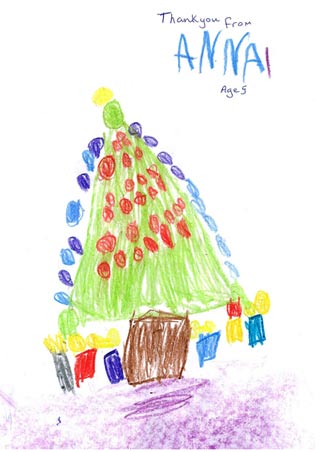當前位置: Language Tips> 英語學習專欄
分享到
要分別了,懵懂的孫子像往常一樣無憂無慮,而孤獨的老人憂心忡忡。終究還是不能避免離別時的傷心不舍和分別后的牽腸掛肚,老人擔心距離會讓孩子把自己淡忘,畢竟他還只是個蹣跚學步的兩歲孩童。然而,孩子并沒有忘記,在遙遠的電話那頭清晰地喊著:“奶奶……”

闌珊 選 曹旭丹 譯
|
“I will miss you very much when you leave.” I muttered to hide the catch in my voice. Thirty-month-old Andy leaned across my living-room rug and handed me a green, plastic suitcase no larger than a walnut and asked, “Will you come to visit?” “Of course,” I said with as confident a tone as I could muster over the lump in my throat. “I’ll do what I can to keep our connection alive,” I thought, “but you’re so young, you’ll forget me in no time.” It was the last afternoon in my year of taking care of my grandson three afternoons a week. We filled his mother’s old, red-plastic circus train with the giraffe, elephant, and monkeys and pushed them under the footstool. We pretended they were moving to Michigan[2] next week, too. Then we went on our usual amble[3] up the block. He stopped along the way to poke rocks with a stick and pick up leaves. “Here, Nana. This is for you,” he beamed, and offered me an apple leaf and a piece of gravel. I stuffed them into the pocket of my jeans, a precious hoard[4] against the coming drought of our separation. On our way home, we checked the fences in vain for his favorite neighborhood cat, an albino named Captain Marvel. Andy galloped[5] past me, arms out-stretched into the breeze, mane[6] flying. Then he stopped, grabbed the leg of my jeans, and kissed my knee. A tidal wave of pleasure washed over me. I floated along the sidewalk. Then Andy looked up at the 39 front stairs winding through my terraced garden, threw up his arms, and announced that he was too tired, “Nana. Carry me.” I sat down on the first step. “You know I can’t do that. We’ll have to go up on our bottoms.” He settled beside me on the cold stone and laughed as we plopped our way up past the daisies, one step at a time. At step No. 10, he stood to reach one of the “hats” he likes to pull off the poppy buds and, mindless of his being too tired, scrambled the rest of the way to the front door. Stupefied[7] from the effort of slowing down to toddler time, I sank onto the living-room floor and lay on my back—a desert traveler buried in sand. He flung himself on my chest, pried up my eyelids, and shouted, “Nana, let’s go rake the yard!” “You’re going to miss this. You really are,” I thought, as I yanked[8] myself back into action. On the last day that I picked him up from nursery school, he walked toward me with downcast eyes and a secret smile. Then, like a magician revealing a magic coin, he opened his fist and reached up with a necklace made of bits of dried pasta[9] and orange and green plastic beads. “For Mommy?” I asked. “No, Nana. It’s for you!” Now he had me whirling on the ballroom floor. He’d been gone a week. The empty white shelves where he kept the miniature train and airport and cash register stared at me in the hall—a reminder of the emptiness I felt. I had thought I would enjoy my freedom to rush right through my “to do” list without a pause—no lying about on the rug. But even when I managed to go all the way until lunchtime without thinking of him, I was not consoled. My nightstand held the valentine he’d made me—two pages of red construction paper stapled together at the top, covered with misshapen color—marker circles and big black dots. Whenever I worried that our connection might be fading, I opened the drawer and felt his energy flutter up around me like a freed canary[10]. Late one rainy afternoon, pinched[11] by the unavoidable, I sat at my desk paying bills. The phone rang, I grabbed the receiver and wanted to shout, “Will you leave me alone so I can finish one thing!” but I hesitated. All I heard was silence—maybe one of those automated phone calls gone bad. Then I heard some garbled[12] mumbling. “That’s not English; it must be a wrong number,” I thought, and I reached over to hang up the receiver. Then Andy’s clear treble boomed, “Nana!” My heart burst at the sound of his dear, familiar voice. I heard his amazement, “I pushed the buttons, and there you are!” I could almost see his blue eyes widening, and the golden froth of hair on his forehead, smell his teddy-bear scent, and feel his plump fingers snug around my thin ones. Thank goodness for the telephone, I thought as we exchanged pretend hugs through the wires. Then I hung up and smiled as I turned back to my desk. I hadn’t lost him after all. |
“你走后,我會非常想你的,”我小聲說,想掩住嗓音里的哽塞。 30個月大的安迪斜倚在我起居室的小地毯上,遞給我一個還沒有核桃大的綠色塑料手提箱,問道:“你會來看我嗎?” “當然了,”我克制住喉嚨的哽咽,用盡量堅定的語氣說道。 “我會盡我所能跟你保持聯(lián)系,”我心想,“但是,你還這么小,很快就會把我忘記了。” 那年我每周可以照看孫子三個下午,這是最后一個下午。我們在他媽媽的那輛陳舊的、紅色塑料的環(huán)形火車里塞滿長頸鹿、大象和猴子等玩具,然后把它們推到腳凳底下,假裝它們下周也會跟他一起去密歇根。 隨后我們像往常一樣到街上散步。他沿著路邊走邊停,用棍子戳石頭或拾起落葉。 “過來,奶奶!這個是給你的。”他微笑著遞給我一片蘋果樹葉子和一粒石子。我把它們裝進牛仔褲口袋里,作為一份珍貴的收藏品,因為分別后我即將一無所有。 在回家的路上,我們徒勞地在柵欄周圍尋找他最喜歡的那只鄰居家的貓,它是一只名叫“奇跡船長”的患了白化病的小貓。 安迪像匹馬一樣飛跑著超過了我,他伸出雙臂在風中揮舞,頭發(fā)隨風飛揚。隨后他停了下來,抓住我的牛仔褲,親我的膝蓋。一陣喜悅的浪潮涌來,傳遍我的全身,我飄飄然地走在人行道上。 后來安迪抬頭看到從我那梯臺式花園里蜿蜒而過的39級前門臺階,他抬起胳膊,說他太累了:“奶奶,抱我。” 我在第一級臺階上坐下來,說:“你知道我不能這么做。我們都得用自己的腳走上去。” 他挨著我坐在冰涼的石頭上。后來,當我們從雛菊間穿過,向上撲通一下前進時他就哈哈大笑,每次爬一個臺階。 爬到第十級臺階時,他站住,伸手去夠一種他平時就喜歡摘的窯粟花蕾上的“帽子”,于是不記得他所說的太累了,一口氣爬完剩下的臺階,直到前門。 努力放慢速度和一個蹣跚學步的孩子同步,這讓我疲憊不堪,我倒在起居室的地板上,仰面躺了下來——如同一個埋在沙子里的沙漠旅行者。 他撲進我懷里,掀開我的眼皮,嚷道:“奶奶,咱們?nèi)ゴ驋咴鹤影桑?/p> “你會想念這事的,你真的會。” 我一邊這樣想著,一邊猛力起身重新開始活動。 最后一天,我到托兒所接他,他低垂著眼睛向我走過來,臉上帶著一絲神秘的笑。然后,像魔術師變出魔術幣一樣,他張開拳頭,伸到我面前,原來是一串用干意大利粉面團和橙色、綠色的塑料珠子做成的項鏈。 “給媽媽的?”我問。 “不是,奶奶。這是給你的!”他讓我覺得我正在舞廳的地板上旋轉(zhuǎn)。 他已經(jīng)走了一星期了。他用來存放小火車、飛機場和收銀機的白色架子們空空如也,它們在大廳里盯著我,提醒我他走后我內(nèi)心的空虛。 我曾以為我會享受我的自由,按我安排的“待辦事項”清單忙碌不堪,不會躺在地墊上無所事事。但是,即使我在午飯前忙個不停,努力讓自己不去想他,我還是沒有得到絲毫安慰。 我的床頭柜里有他情人節(jié)時給我制作的禮物——兩張頂部訂在一起的紅色圖畫紙,上邊用彩筆涂滿奇形怪狀的圈圈和大黑點。每當我擔心我們的關系可能正在淡漠的時候,我就打開抽屜,會感到他的活力像自由的金絲雀兒一樣在我周圍飛舞。 一個下雨的午后,接近傍晚時,我因為一些必須要做的事情而煩悶不堪,坐在桌邊支付賬單。電話響了,我抓起聽筒想大叫:“能不能別打擾我,讓我好好做完一件事!”但是,我猶豫了。 我聽到的只有沉默——可能是哪部自動電話出了故障。然后我聽到些含含糊糊的咕噥聲。 “這不是英語。肯定是撥錯號碼了。”我心想,于是伸手去掛聽筒。 這時,傳來了安迪清晰響亮的叫聲:“奶奶!” 聽到他親切熟悉的聲音,我的心開始怦怦跳。 我聽出他的驚訝:“我按了幾個按鈕,就真找到你啦!”我?guī)缀跄芸吹剿牬蟮乃{色眼睛和貼在前額泡沫一樣的金黃頭發(fā),聞到他身上泰迪熊的香味,感到他胖乎乎的手指蜷在我干瘦的手指里。 當我們通過電話線假裝互相擁抱的時候,我心想:真是感謝這部電話!掛斷電話,我微笑著回身到桌旁。我終究沒有失去他。 (來源:英語學習雜志 編輯:中國日報網(wǎng)英語點津 陳丹妮) |
|
Vocabulary: 1. go the distance: 自始至終,堅持到底。 2. Michigan: (國家)密歇根。 3. amble: 漫步,徐步。 4. hoard: 儲藏,積存。 5. gallop: (馬等的)飛跑,奔馳。 6. mane: (馬等的)鬃;(人的)長發(fā)。 7. stupefy: (尤用于被動語態(tài))使(某人)神志不清或失去知覺。 8. yank: 猛拉(某物)。 9. pasta: 意大利面食(如通心粉、細面條、方形餃)。 10. canary: 金絲雀。 11. pinched: (因某事)受罪的,痛苦的。 12. garbled: (指信息)混亂的,含糊的,引起誤解的。 |
上一篇 : 音樂往事:遙遙無期的狂想曲
下一篇 : 如何與小女孩兒談話
分享到
翻譯
關于我們 | 聯(lián)系方式 | 招聘信息
電話:8610-84883645
傳真:8610-84883500
Email: languagetips@chinadaily.com.cn